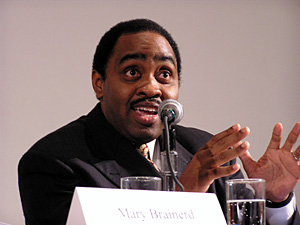|
Audio
Photos
More from MPR
Resources
Respond to this story
|
Community leaders discouraged by immigrant study
December 14, 2004
A panel of Twin Cities community leaders say they're discouraged by the attitudes of Minnesotans who are fed up with immigrants. A new study has found that many Minnesotans believe immigrants are a drain on public services and that they shun assimilation. The opinions were strongest among people living in the outer-ring suburbs. The panelists were brought together by the Minnesota Community Project, a group founded by former Vice President Walter Mondale. The discussion today at the University of Minnesota's Humphrey Institute was designed to debunk misperceptions about immigrants.
St. Paul, Minn. — The Community Project study found that Minnesotans are annoyed with many things including state government, high taxes and congested roads. But some of the harshest criticism was aimed at immigrants. In focus groups, one respondent said immigrants should quote, "stay home." Another said immigrants are only in the state "to have babies and get money."
Panelists at the University of Minnesota event represented business, education and philanthropy organizations. Emmett Carson, president and CEO of The Minneapolis Foundation, told a standing-room-only crowd at Cowles Auditorium that he's surprised immigrants are such a lightning-rod right now.
 | |||
"In 1900 in Minnesota, the diversity here was 29 percent of people were from foreign countries. Today it's 5 percent. What's the fuss about?" says Carson. "In part the fuss is about: they're people of color, they're from more diverse places, but the reality is we've been here before."
Panelist Lee Pao Xiong has felt the growing tension first-hand. He says he was harassed by teenagers on a recent hunting trip. The kids were upset with Asian Americans after a hunter, who is Hmong, man shot and killed six hunters in Wisconsin. And Xiong says there are other visible reminders that he's not wanted in Minnesota.
"You know now to see signs like 'Save the Deer. Kill the Hmong,'" says Xiong. "I mean, that's just unbelievable. It's unbelievable."
Xiong directs the Center for Hmong Studies at Concordia University in St. Paul. He says he's amazed by all of the myths about immigrants, particularly that they're a drain on the state. He says 93 percent of immigrants work and pay taxes. And in St. Paul, he says there are 300 Hmong businesses. Last year they paid a total of $22 million in state and local taxes.
Xiong says people also mistakenly think that most immigrants get to Minnesota on the government's tab. "I remember when we came to America, we got on the plane, my father was in the military and he was a high-ranking military officer and he became a janitor and he worked his way up and we paid the airline ticket that brought us over to America," says Xiong. "And even now when we sponsor the families from Thailand over, we have to sign an agreement that the family will not be on welfare."
By correcting the record, panelists say they hope to counter negative attitudes about immigrants before they intensify.
Emmett Carson believes education is the key. But he also believes there are some Minnesotans who can't be swayed and their opinions can rub off on others.
"This is an early diagnosis of a cancer in our community because you have to understand, this isn't represented totally by people who just don't get it," says Carson. "It's also represented by people who get it and who have bigoted, racist views toward other people. And if left alone, if left to fester, it will tear this community in parts in ways we've seen before."
Carson says The Minneapolis Foundation is so concerned about this issue that it will hold a series of Minnesota Meetings beginning in February to help shape a statewide agenda on immigration.
|
News Headlines
|
Related Subjects
|

